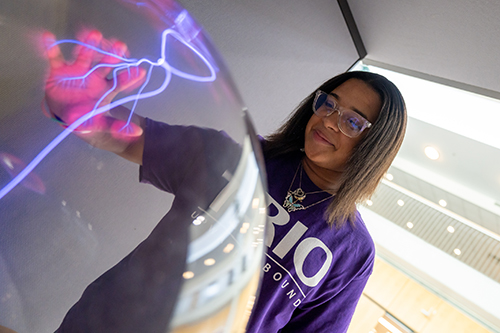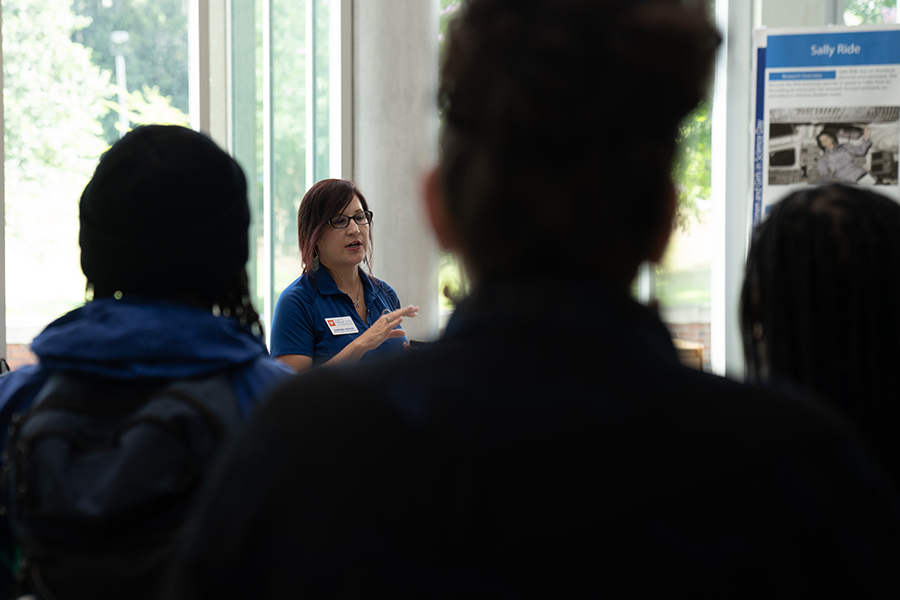While community colleges have opened the door to higher education for many by providing a lower-cost entry to a more advanced four-year degree, the path forward is not always clear — a hurdle the College of Liberal Arts and Sciences at the University of Florida is working to remove.
Eighty percent of community college students say their goal is to earn a bachelor’s degree, yet only 16% succeed, according to the Community College Research Center at New York’s Columbia College.
Adrienne Provost, director of student strategic initiatives in CLAS, has researched the many reasons for this disheartening statistic and has begun to attack them one at a time.
“One troubling aspect is that if you’re a community college student you have to make your transfer application based on the major, so there’s no time for exploring majors. Having worked for nearly 10 years at Santa Fe College, I know that there are limited opportunities for students to understand the diversity of majors available at UF,” Provost said.
Provost has found that sparking a student’s curiosity through hands-on, experiential learning leads to success in higher education. For low-income, first-generation, students — including those coming from rural areas — access to these programs can be limited.
Venturing beyond the typical college tour, new workshops have been developed to provide high school students with real-life, hands-on exposure to what life as a UF student is truly like. Students are guided in making connections between possible areas of study and potential opportunities for jobs and fulfilling careers.
Starting early is critical. A group of Bradford County High School students, all part of the Upward Bound program at Santa Fe College, recently visited the UF campus in Gainesville to help them see themselves as UF students. Upward Bound is a pre-college division of the broader federal TRIO umbrella of programs designed to support educational opportunities for students from disadvantaged backgrounds.
Yolanda Thomas, coordinator of Upward Bound at Santa Fe, said these workshops are invaluable engagement for students.
“Tours allow our students to see the buildings on campus, but these experiences help them understand and experience what goes on inside the buildings, to strike their curiosity,” Thomas said. “We hope to provide the knowledge, resources, and support to help along their chosen path, not just high school and college, but in life overall.”

Provost has developed the Going Gator initiative as a pathway from community colleges across Florida into academic departments across CLAS. So far, agreements have been developed with Santa Fe and Florida Gateway College. Going Gator allows students a behind-the-scenes look at 17 different majors from African American Studies and Astronomy to Philosophy and Physics — and offers a direct pathway to a four-year degree at UF.
“Going Gator offers wonderful opportunities for students to have more direct mentorship because these are majors that are going to have smaller class sizes which replicate what they’re having at the community college.” Provost adds, “Part of Going Gator is proactive outreach and advising so that we’re hoping to intervene before students take courses that aren’t going to count towards the track that they’re looking to go down.”
This speaks directly to the US Government Accountability Office finding that roughly 43% of college credits earned by transfer students do not get counted toward their new college degree. This is just one of the challenges facing students that Provost says Going Gator helps them overcome.
It is the intersection of experiential workshops and Going Gator that Provost feels uniquely benefits a student’s ability to successfully negotiate their own pathway in higher education. By allowing students to experience something hands-on, early in their community college or even high school years, they have access to a greater understanding of where their passions may drive them.
At the core of these programs, according to Provost is, “the belief that higher education is the ability for students to have access to social mobility. The more ways we can expose students to the variety of options available, and to make those connections to a career, I think the more valuable that our services become.”
